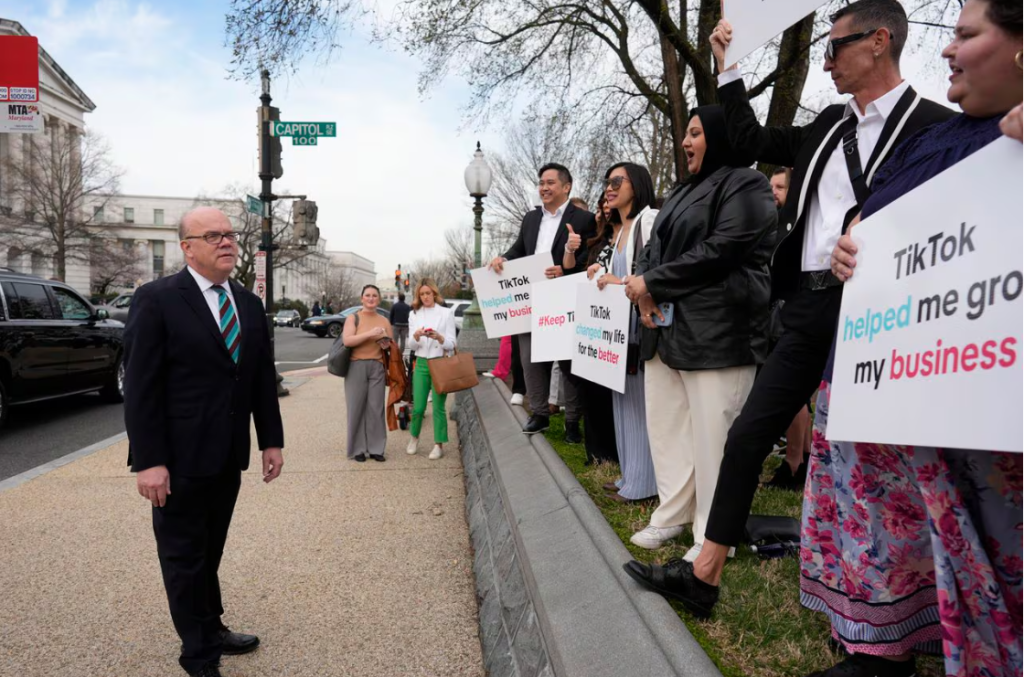【中美创新时报2024年3月14日华盛顿讯】(记者温友平编译)当 TikTok 用户向国会发出大量反对可能禁止这款流行视频应用程序的法案时,众议员杰克·奥金克洛斯 (Jake Auchincloss) 表示,他的办公室收到了一封如此令人不安的邮件,这让他确信这项立法是必要的。《波士顿环球报》记者吉姆·普赞格拉(Jim Puzzanghera)对此作了如下述评报道。
“我们收到了一名年轻人的语音邮件,威胁如果我们禁止 TikTok,他就会自杀。这就是一个很好的例子……这些应用程序对我们的年轻人产生的有害影响,”牛顿民主党人杰克·奥金克洛斯说,并补充说,另一封语音邮件来自一个因潜在禁令而歇斯底里哭泣的人。 “我的意思是,国会需要控制住这个问题。”
奥金克洛斯是周三众议院两党压倒性多数票中的一员,众议院以 352 票对 65 票通过了《保护美国人免受外国对手控制应用程序侵害法案》,该法案将禁止 TikTok 在美国上市,除非其中国所有者字节跳动将其六个月内出售给非中国公司 。TikTok 对年轻人心理健康的影响只是奥金克洛斯动机的一部分——他补充说,他还担心中国政府正在使用该应用程序收集 1.7 亿美国用户的个人数据,并可能将其“武器化”以传播错误信息 。
但该立法的一些反对者批评这是一次针对单一应用程序的仓促尝试,而不是以更全面的方式解决社交媒体的问题。这导致全民主党的马萨诸塞州众议院代表团出现分裂——五名成员投了赞成票,四名反对——这也是可能导致该法案在参议院脱轨的几个因素之一。
投票反对该法案的伍斯特民主党众议员吉姆·麦戈文(Jim McGovern)表示:“我们在这里提出的关于保护人们个人数据、算法和错误信息的担忧不仅仅是 TikTok 的问题。” 他指出,该立法并未涉及数据经纪人的角色,即使字节跳动被迫出售 TikTok,中国政府也可以利用数据经纪人来获取美国人的数据。
“这是具有巨大影响的事情。这个应用程序有 1.7 亿用户,”他说。“我想确保,当我们立法时,我们实际上是在做真正有意义的事情,并且确实能够解决问题。”
与麦戈文一起反对的还有马萨诸塞州的里维尔众议员凯瑟琳·克拉克(Katherine Clark)、斯普林菲尔德众议员理查德·尼尔(Richard Neal)和波士顿众议员艾安娜·普雷斯利(Ayanna Pressley)。
众议院民主党第二号人物克拉克在谈到俄罗斯入侵引发的战争为乌克兰提供的资金时表示:“我对数据安全感到严重担忧,但我反对共和党快速推进这项法案,同时他们还积极阻挠紧急的国家安全紧急资金。”
该州的两位参议员,民主党人埃德·马基(Ed Markey)和伊丽莎白·沃伦(Elizabeth Warren),也呼吁采取全面的方法,并于去年提出了更广泛的法案。
马基在一份声明中表示:“TikTok 是时候停止收集有关我们年轻人的大量数据来为其有针对性的广告机器提供动力了。” “我们不需要禁止 TikTok 来解决这些侵入性做法。我们需要通过《儿童和青少年在线隐私保护法》,并结束针对儿童和青少年的定向广告。”
众议院通过的 TikTok 法案的支持者希望两党的强有力投票为参议院考虑该法案提供动力。参议院多数党领袖、纽约民主党人查克·舒默(Chuck Schumer)尚未承诺将该法案付诸表决。 马基等参议员也反对一项狭隘的法案,他周三补充道,“我们不仅面临 TikTok 的问题,我们还面临大型科技公司的隐私问题。”
但也有强有力的支持。参议院情报委员会主席、弗吉尼亚州民主党人马克·沃纳 (Mark Warner) 和该委员会首席共和党人、佛罗里达州参议员马可·鲁比奥 (Marco Rubio) 周三发表联合声明,称他们“一致关注 TikTok 构成的国家安全威胁”,并将努力推动法案成为法律。
中国外交部发言人周三批评这项立法没有必要。这是美国近年来针对TikTok的最新举措。前总统唐纳德·特朗普试图利用行政命令强制出售该应用程序,但没有成功。但他最近公开反对该法案,因为他表示这将增强 Facebook 的权力,他称 Facebook 为“人民的敌人”。
尽管如此,在众议院,只有 15 名共和党人反对该法案,加入了 50 名民主党人的行列。
众议院能源和商业委员会主席、众议员凯茜·麦克莫里斯·罗杰斯 (Cathy McMorris Rodgers) 表示:“在过去的一周里,我们实时看到了(中国共产党)控制的 TikTok 如何利用其影响力和权力迫使用户联系他们的代表,如果他们想继续使用该应用程序的话。” “这只是中共如何将其控制的应用程序武器化以操纵数千万人以推进其议程的一小部分。”
TikTok 法案于上周提出,在立法者收到情报和执法官员的机密简报后,该法案匆忙进行了全面投票。该立法将适用于外国对手拥有并被视为存在国家安全风险的任何社交媒体平台,尽管它是专门针对 TikTok 而设计的。
“无论你使用哪个社交媒体平台,我们都不应该希望中国共产党控制它…… 控制你的信息流,访问你的私人数据,”塞勒姆民主党众议员塞思·莫尔顿(Seth Moulton)说,他与奥金克洛斯一起是该法案的共同发起人。“如果苏联在冷战期间试图收购《波士顿环球报》,我认为我们不会让这种情况发生。这确实是同一件事。”
莫尔顿表示,他预计 TikTok 不会在美国被禁止。
“中国现在急需资金,所以我认为他们不会以数十亿美元出售这个产品的想法可能是不正确的,”他说。
众议院中国共产党特别委员会成员奥金克洛斯表示,在国会解决社交媒体更广泛的问题之前,需要立法。
“国会需要让这些公司承担责任,”他说。“但国会追究他们责任的第一步是确保他们对美国法律负责。目前,TikTok 听命于(中国国家主席)习近平,而不是听命于美国人民。”
奥金克洛斯最近推出了《验证儿童在线隐私法案》,该法案将儿童特殊联邦保护的年龄从 13 岁提高到 16 岁。它还要求社交媒体公司开发周围的限制方法来验证用户的年龄,以便儿童无法工作 。
“如果这项法案获得通过,无论它是否被禁止,这实际上都取决于 TikTok,”他说。 “如果他们卖了,就会有买家,那就不一定是禁令。”
题图:伍斯特民主党众议员吉姆·麦戈文(Jim McGovern)周三在美国国会大厦外观看 TikTok 粉丝。斯科特·阿普尔怀特/美联社.(J. SCOTT APPLEWHITE/ASSOCIATED PRESS)
附英文原文报道:
Potential TikTok ban wins strong support in House, but some worry it doesn’t tackle broader social media problems
By Jim Puzzanghera Globe Staff,Updated March 13, 2024
WASHINGTON — As TikTok users flooded Congress with calls opposing a bill that could ban the popular video app in the United States, Representative Jake Auchincloss said his office received one so disturbing that it convinced him the legislation was needed.
“We got a voicemail from a young individual threatening suicide if we banned TikTok. That is a case in point . . . of the deleterious impact that these apps are having on our youth,” the Newton Democrat said, adding that another voicemail came from a person sobbing hysterically over a potential ban. “I mean, Congress needs to get a grip on this.”
Auchincloss was part of an overwhelming bipartisan House majority on Wednesday that voted 352-65 to approve the Protecting Americans from Foreign Adversary Controlled Applications Act, which would ban TikTok in the United States unless ByteDance, its Chinese owner, sells to a non-Chinese company in six months. The mental health impact of TikTok on young people was only part of Auchincloss’s motivation — he added that he also is concerned that the Chinese government is using the app to collect personal data on its 170 million American users and could “weaponize” that to spread misinformation.
But some opponents of the legislation criticized it as a rushed attempt to target a single app instead of addressing the problems of social media in a more comprehensive way. That led to a split in the all-Democratic Massachusetts House delegation — five members voted for it and four against — and is one of several factors that could derail the bill in the Senate.
“The concerns that we’re raising here about the protection of people’s personal data, about algorithms and misinformation, are not just an issue for TikTok,” said Representative Jim McGovern, a Worcester Democrat who voted against the bill. He noted the legislation doesn’t address the role of data brokers, which the Chinese government could use to access Americans’ data even if ByteDance is forced to sell TikTok.
“This is something that has huge implications. There are 170 million users of this app,” he said. “I want to make sure that when we’re legislating that we’re actually doing things that are actually meaningful, and actually will solve a problem.”
Joining McGovern in opposition from Massachusetts were Representatives Katherine Clark of Revere, Richard Neal of Springfield and Ayanna Pressley of Boston.
“I have serious concerns about data security, but I’m opposed to the Republican fast tracking of this bill while they actively obstruct urgent national security emergency funding,” said Clark, the second-ranking House Democrat, referring to money for Ukraine in the war triggered by Russia’s invasion.
The state’s two senators, Democrats Ed Markey and Elizabeth Warren, also have called for a comprehensive approach, and both proposed broader bills last year.
“It’s time for TikTok to stop collecting massive amounts of data on our young people to fuel their targeted advertising machine,” Markey said in a statement. “We don’t need to ban TikTok to fix these invasive practices. We need to pass my Children and Teens’ Online Privacy Protection Act and put an end to targeted advertising to kids and teens.”
Supporters of the TikTok bill passed by the House hope the strong bipartisan vote provides momentum for the Senate to consider it. Senate majority leader Chuck Schumer, a New York Democrat, has not committed to bringing the bill to a vote. And there is opposition to a narrow bill from senators such as Markey, who added Wednesday, “We don’t have only a TikTok problem — we have a Big Tech privacy problem.”
But there is also strong support. Senate Intelligence Committee chairman Mark Warner, a Virginia Democrat, and the panel’s top Republican, Marco Rubio of Florida, issued a joint statement Wednesday saying they are “united in our concern about the national security threat posed by TikTok“ and would work to push the bill into law.
A China Foreign Ministry spokesperson blasted the legislation on Wednesday as unnecessary. It’s the latest move in the United States in recent years to target TikTok. Former president Donald Trump unsuccessfully tried to use an executive order to force the sale of the app. But he recently came out publicly in opposition to the bill because he said it would increase the power of Facebook, which he called “an enemy of the people.”
Still, in the House, only 15 Republicans opposed the bill, joining 50 Democrats.
“Over the past week, we saw in real time how the [Chinese Communist Party]-controlled TikTok, used its influence and power to force users to contact their representatives if they even wanted to continue using the app,” said Representative Cathy McMorris Rodgers, chair of the House Energy and Commerce Committee. “And this is just a small taste of how the CCP weaponized this application it controls to manipulate tens of millions of people to further its agenda.”
The TikTok bill was introduced last week and rushed to a full vote after lawmakers received a classified briefing from intelligence and law enforcement officials. The legislation would apply to any social media platform that is owned by a foreign adversary and deemed a national security risk, although it’s specifically designed to target TikTok.
“No matter what social media platform you’re on, we shouldn’t want the Chinese Communist Party controlling it . . . controlling your feeds, having access to your private data,” said Representative Seth Moulton, a Salem Democrat and cosponsor of the bill along with Auchincloss. “If the Soviet Union had tried to buy the Boston Globe in the middle of the Cold War, I don’t think we would have let that happen. This is really the same thing.”
Moulton said he doesn’t expect TikTok to be banned in the United States.
“China is desperate for money right now, so I think the idea that they wouldn’t sell this for billions of dollars is probably not true,” he said.
Auchincloss, a member of the House Select Committee on the Chinese Communist Party, said the legislation is needed before Congress can address the broader problems with social media.
“Congress needs to hold these corporations to account,” he said. “But the first step to Congress holding them to account is making sure that they’re answerable to US law. Right now, TikTok answers to [Chinese President] Xi Jinping, not to the American people.”
Auchincloss recently introduced the Verifying Kids’ Online Privacy Act, which would increase the age for special federal protection of children to 16 from 13. It also would require social media companies to develop ways to verify the ages of their users so children couldn’t work around the restriction.
“It’s really going to be up to TikTok, if this bill is passed, whether or not it’s banned,” he said. “If they sell, and there will be buyers for it, it doesn’t have to be a ban.”

